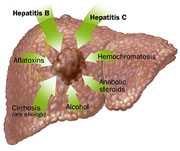Liver Cancer: Multidisciplinary Care Matters
When cancer cells form in the liver, it’s called primary liver cancer. Cancer that has spread to the liver from another part of the body is secondary or metastatic liver cancer.

If you or a family member has been diagnosed with this condition, you want to make sure your doctor chooses the most effective treatment plan for you.
A Multidisciplinary Liver Cancer Care Team
At Johns Hopkins, our experts present most patients with liver cancer at a multidisciplinary tumor board. This allows many different specialists to work together to determine the best treatment plan for each patient’s unique circumstances.
For example, certain patients may benefit from receiving chemotherapy before surgery. Other patients may benefit from chemotherapy or radiation after surgery.
Johns Hopkins’ multidisciplinary liver cancer treatment team includes:
- Surgical oncologists
- Medical oncologists
- Radiation oncologists
- Transplant experts
- Interventional radiologists
- Gastroenterologists
- Hepatologists
- Pathologists
Benefits to Multidisciplinary Liver Cancer Care
Patients who seek multidisciplinary cancer care benefit from:
- More collaborative care: When medical professionals of different specialties work in one place, they can easily collaborate and discuss key details about their patients. Johns Hopkins specialists meet weekly to provide patients with the most comprehensive care possible.
- Convenience: Patients can meet with more than one expert in a single visit, because all of the specialists are in the same place. Liver tumor center coordinators help patients manage multiple aspects of their treatment and follow-up.
- Tailored treatment plans: Would chemotherapy be most effective before or after surgery? How can interventional therapies benefit patients with cancer that won’t respond to surgery? A multidisciplinary care team determines the best — and most effective — treatment plan, one patient at a time.
An Integrated Approach to Liver Cancer Treatment
Today, many patients who have liver cancer receive multiple types of treatment. This is especially true for patients with metastatic liver cancer, which sometimes requires many different modes of therapy.
Consider these two examples that illustrate the benefits of multidisciplinary care:
- Transplant considerations: When doctors evaluate a patient in a multidisciplinary environment, transplant surgeons and surgical oncologists can collaborate on whether the individual might be a good candidate for a liver transplant. A liver transplant can treat certain liver cancers, but not all patients are candidates for this treatment. This collaborative method ensures you get the most effective care, appropriate to your specific needs.
- Evolving research: Researchers at Johns Hopkins and other medical institutions continue to explore new liver cancer treatment advances, such as more targeted chemotherapies and immunotherapy. With a multidisciplinary care team that focuses on liver cancer, patients have earlier access to the latest therapies and most effective treatment modalities.
Surgical Care for Liver Cancer




